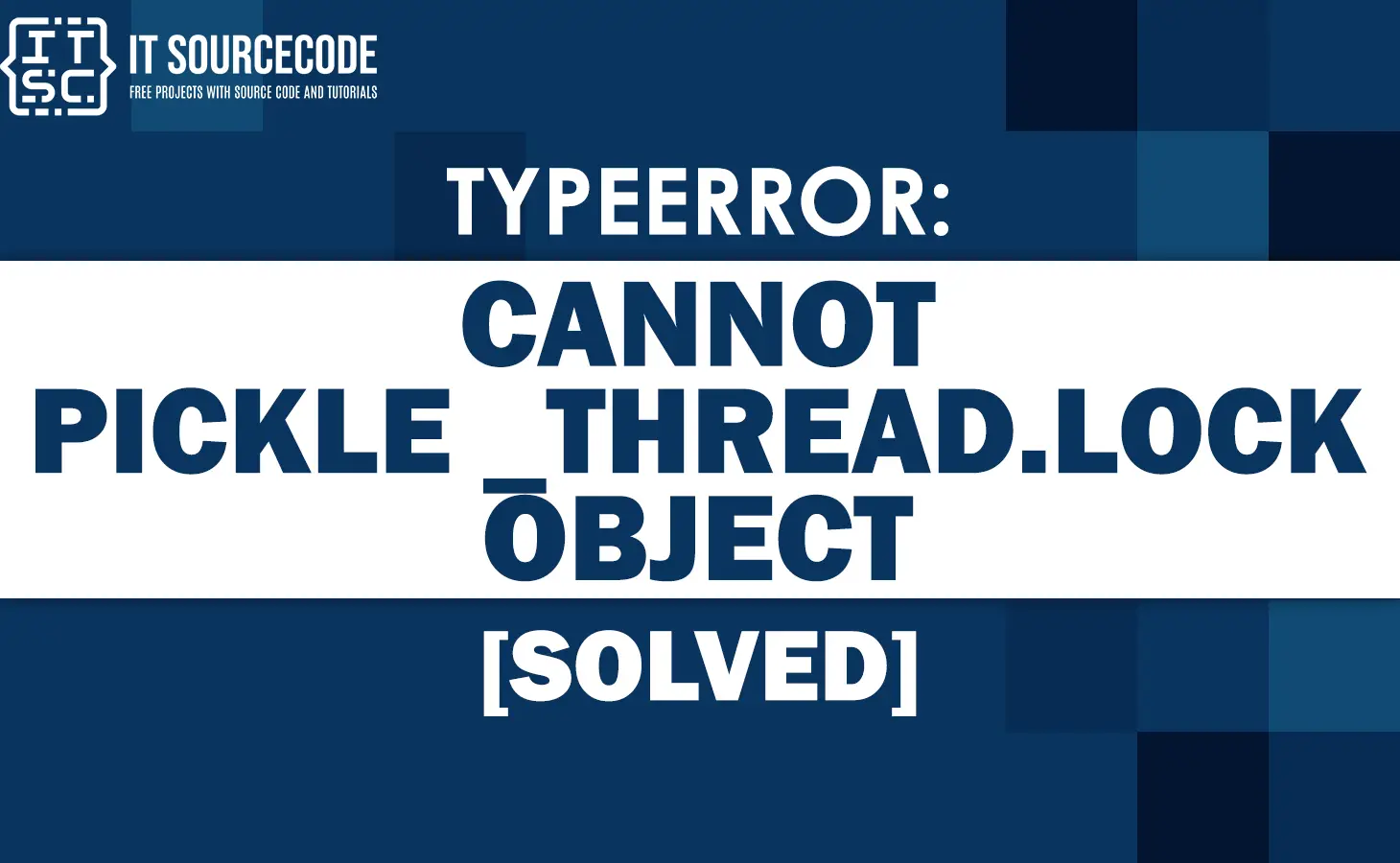Do you encounter the “Typeerror: cannot pickle thread.lock object” error message in Python?
Worry no more! because this article will help you to resolve that problem.
In this article, we will discuss “Typeerror: cannot pickle _thread.lock object”, provide the possible causes of this error, and give solutions to resolve the error.
So first, let us know what this error means.
What is Typeerror: cannot pickle _thread.lock object?
The Typeerror: cannot pickle _thread.lock object is an error message in Python indicating that you are trying to serialize or “pickle” an object that contains a “_thread.lock” object.
_thread.lock
A “_thread.lock” object is a synchronization primitive used in Python to manage access to shared resources between multiple threads.
How does Typeerror: cannot pickle _thread.lock object occurs?
The “Typeerror: cannot pickle _thread.lock object” error typically occurs because Python’s pickle module cannot serialize or “pickle” _thread.lock objects.
When you try to pickle an object that contains a “_thread.lock” object, you will encounter the error message:
Typeerror: cannot pickle _thread.lock object because “_thread.lock” objects cannot be serialized or pickled.
This is because _thread.lock objects are implemented using C code and are not compatible with Python’s pickling protocol.
Note:
Not all Python objects can be pickled, and certain objects are more likely to cause pickling errors than others.
Here is the example code that triggers the Typeerror: cannot pickle thread.lock object:
import pickle
import threading
def my_func():
lock = threading.Lock()
# some code that uses the lock...
obj = {
'data': 'some data',
'lock': threading.Lock()
}
with open('my_file.pickle', 'wb') as f:
pickle.dump(obj, f)In the example, we define a function my_func() that uses threading.Lock() object for synchronization.
We also create a dictionary obj that contains some data and threading.Lock() object.
We then try to pickle the obj using the pickle.dump() method and write it to a file.
However, because obj contains threading.Lock() object, we will encounter an error message:
TypeError: cannot pickle '_thread.lock' objectNow let’s fix this error.
How to solve Typeerror: cannot pickle _thread.lock object?
Here are the alternative solutions that you can use to fix this error:
Solution 1: Use the dill module instead of the pickle module:
The dill module is a third-party module.
It can serialize a wider range of Python objects than the built-in pickle module, including objects with thread.lock objects.
You can install dill using pip:
pip install dillTo use dill to pickle an object, replace pickle with dill
Here is the updated code to the sample problem above:
import pickle
import threading
import dill
def my_func():
lock = threading.Lock()
# some code that uses the lock...
obj = {
'data': 'some data',
'lock': threading.Lock()
}
with open('my_file.pickle', 'wb') as f:
dill.dump(obj, f) # we replace pickle.dump() to dill.dump() Solution 2: Remove any thread.lock objects from your object before pickling:
If you have control over the object you are trying to pickle, you can remove any thread.lock objects from it before pickling:
import pickle
import threading
def my_func():
lock = threading.Lock()
# some code that uses the lock...
obj = {
'data': 'some data',
'lock': threading.Lock()
}
# Remove the lock object from obj before pickling
del obj['lock']
with open('my_file.pickle', 'wb') as f:
pickle.dump(obj, f)In this updated code, we remove the lock object from the obj dictionary before pickling it.
We do this by using the del statement to remove the lock key from the dictionary.
This ensures that the pickled object doesn’t contain any thread.Lock objects.
Solution 3: Use a custom __getstate__ method to remove any thread.lock objects:
If you can’t remove thread.lock objects from your object, you can define a custom __getstate__ method that removes them before pickling:
import pickle
import threading
class MyObject:
def __init__(self):
self.data = 'some data'
self.lock = threading.Lock()
def __getstate__(self):
state = self.__dict__.copy()
del state['lock']
return state
obj = MyObject()
with open('my_file.pickle', 'wb') as f:
pickle.dump(obj, f)In this updated code, we define a MyObject class with a __getstate__ method that removes the lock attribute from the object’s state dictionary before pickling.
When we call pickle.dump on an instance of MyObject,
The __getstate__ method is automatically called to get the object’s state dictionary, which is then pickled.
By removing the lock attribute from the object’s state dictionary, we ensure that the pickled object doesn’t contain any thread.Lock objects.
So those are the different solutions that you can use to fix “Typeerror: cannot pickle _thread.lock object”.
I hope one or more of them helps you solve your problem regarding the error.
Here are the other fixed Python errors that you can visit, you might encounter them in the future.
- typeerror unsupported operand type s for str and int
- typeerror: object of type int64 is not json serializable
- typeerror: bad operand type for unary -: str
Conclusion
In conclusion, in this article, we discuss “Typeerror: cannot pickle _thread.lock object”, provide its causes, and give solutions that resolve the error.
By following the given solution, surely you can fix the error quickly and proceed to your coding project again.
I hope this article helps you to solve your problem regarding a Typeerror stating “cannot pickle _thread.lock object”.
We’re happy to help you.
Happy coding! Have a Good day and God bless.

